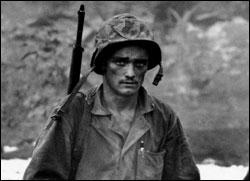Is “The War” Good or Grandiose?

I’ve been making my way through Ken Burns’s 15-hour documentary “The War,” which will begin airing on PBS at 8 p.m. this Sunday, September 23. The conflict, of course, is the Second World War, and the focus is on the American home front, seen through the eyes of ordinary citizens in Waterbury, Conn.; Luverne, Minn; Mobile, Ala.; and Sacramento, Calif. That last city was chosen because it had a sizable Japanese-American population that was shoved into camps out of an irrational fear they would form a Fifth Column. Luverne represented America’s small towns, which were a much larger part of America’s population 65 years ago. Throughout the series, Tom Hanks reads the indelible words of the weekly columns written by Al McIntosh, former editor of Luverne’s Rock County Star-Herald.
Inevitably, I’ve been reaching for the Kleenex during some of the most heartbreaking moments, especially in Luverne, which is not far from the South Dakota town in which I grew up. But I have to say that, on balance, I’m agreeing with Nancy Franklin‘s mostly downbeat assessment of the series in The New Yorker.
Franklin writes that “what’s off-putting is Burns’s approach to the material, and by that I don’t mean what has come to be known over the years since his 1990 opus on the Civil War as ‘the Ken Burns effect’—the pan-and-zoom technique with which Burns creates a sense of life and movement in still images and squeezes emotional juice from them.” For a more positive assessment of the series, go here.
